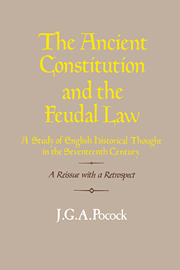 The Ancient Constitution and the Feudal Law
The Ancient Constitution and the Feudal Law Book contents
- Frontmatter
- Contents
- Preface
- Preface to the First Edition
- Part One The Ancient Constitution and the Feudal Law
- I Introductory: the French Prelude to Modern Historiography
- II The Common-law Mind: Custom and the Immemorial
- III The Common-law Mind: the Absence of a Basis of Comparison
- IV The Discovery of Feudalism: French and Scottish Historians
- V The Discovery of Feudalism: Sir Henry Spelman
- VI Interregnum: the Oceana of James Harrington
- VII Interregnum: the First Royalist Reaction and the Response of Sir Matthew Hale
- VIII The Brady Controversy
- IX Conclusion: 1688 in the History of Historiography
- Part Two The Ancient Constitution Revisited: a Retrospect from 1986
- Index
VI - Interregnum: the Oceana of James Harrington
Published online by Cambridge University Press: 18 November 2009
- Frontmatter
- Contents
- Preface
- Preface to the First Edition
- Part One The Ancient Constitution and the Feudal Law
- I Introductory: the French Prelude to Modern Historiography
- II The Common-law Mind: Custom and the Immemorial
- III The Common-law Mind: the Absence of a Basis of Comparison
- IV The Discovery of Feudalism: French and Scottish Historians
- V The Discovery of Feudalism: Sir Henry Spelman
- VI Interregnum: the Oceana of James Harrington
- VII Interregnum: the First Royalist Reaction and the Response of Sir Matthew Hale
- VIII The Brady Controversy
- IX Conclusion: 1688 in the History of Historiography
- Part Two The Ancient Constitution Revisited: a Retrospect from 1986
- Index
Summary
THE next part of this book must be in the nature of an interlude. Viewed as a whole, the work of Spelman shows that it was in his lifetime theoretically possible to subject the common-law interpretation of English history to destructive criticism and build up a new version on radically different lines; but it has already been pointed out that his work could not be viewed as a whole until 1721, eighty years after his death, and the line of advance he had indicated was not taken up until 1675 or 1680. The probability that Spelman was far ahead of the scholars of his generation is supported by the fact that not until some of his literary remains had been published, and not until—some years later still—their true meaning began to be understood, was the feudal reinterpretation of constitutional history resumed in detail. In addition, the years after his death were revolutionary in their effect on the English use of history, as in so much else, and his work was reread in a new setting. It will be best to treat the mid-century as a period during which the minds of scholars and polemicists were prepared to make full use of Spelman's ideas when the meaning of these was at last made plain to them.
By 1649, the fundamental problem of the Interregnum had emerged: a truncated single chamber was ruling, and claiming powers to which there seemed no clear limit, in the name of the ancient constitution.
- Type
- Chapter
- Information
- The Ancient Constitution and the Feudal LawA Study of English Historical Thought in the Seventeenth Century, pp. 124 - 147Publisher: Cambridge University PressPrint publication year: 1987
